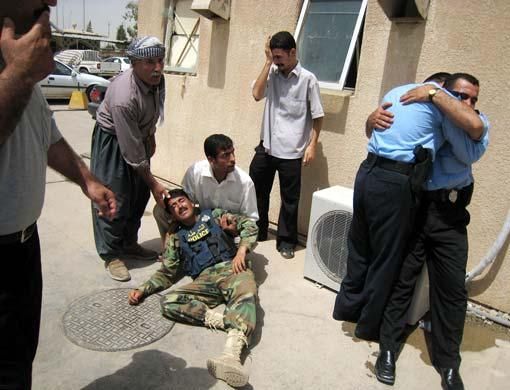Baghdad: Iraqi Prime Minister Nouri Al Maliki said yesterday a much-anticipated summit of the country's leaders to resolve a political deadlock could begin in the next two days.
Al Maliki, whose "national unity" government has been in crisis since the main Sunni Arab bloc quit, said he would either lure them back or find others to replace them.
"We must look for solutions for the problems we are facing. I've called the political leaders for a meeting to discuss the main issues in the political process," Al Maliki said. "The first meeting may happen tomorrow or the day after tomorrow."
US officials have called the meeting a make-or-break moment for the government, which was formed in 2006 to reduce violence by including all groups, but has been paralysed by boycotts and infighting on ethnic and sectarian lines.
The worst split occurred this month when the main Sunni Arab bloc, the Accordance Front, pulled its six members out.
"The Sunni Arabs, who along with Shiites and Kurds are one of the three parts of Iraqi society, will not be excluded from the government," Al Maliki said.
The prime minister said he hoped the front would return.
Cabinet seats vacant
But he also said he could replace them with other Sunni Arabs - possibly with tribal shaikhs who have emerged over the past year as a powerful force in Sunni Arab areas in the vast desert province of Anbar west of Baghdad. The shaikhs, who have assembled the first major armed Sunni Arab groups to support Al Maliki's Shiite-led government and its US allies, have seized control of areas previously held by insurgents and are thought to have national political ambitions.
US officials have expressed mounting frustration with the stalled political process in Baghdad as Al Maliki's government has failed to agree on laws aimed at reconciliation.
Nearly half of the cabinet is no longer participating in its meetings. In addition to the Sunni Arabs, supporters of powerful Shiite cleric Moqtada Al Sadr have also quit the government.
The secularist bloc of former interim prime minister Eyad Allawi is also boycotting cabinet meetings.
Al Maliki said he would give seats vacated by the Accordance Front to other Sunni Arabs who had offered to take their place if the front did not reclaim them.
Asked if he had agreed to give the vacant seats to the tribal shaikhs, Al Maliki said: "There are people who have come forward and offered to be an alternative."
"We all hope that this crisis will end and the problems be solved and the ministers return to their ministries. But if, God forbid, this does not happen, then we will go to the brothers who have come forward and choose replacements," he added.
The shaikhs have emerged as crucial power brokers since late last year, when they assembled militias that have seized control of most of Anbar, Iraq's largest province, from Al Qaida militants.
Washington has sent 30,000 additional troops to Iraq this year and launched an offensive in Baghdad and nearby provinces.













